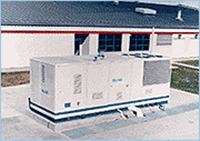Fuel Cells
 Large capacity fuel cells are now available to provide "clean" uninterrupted AC power for such critical installations as hospitals, computers, or areas subject to low voltage, where normal combustible fuel generators are not feasible, or are undesireable. These cells can operate in conjunction with, or independent of a commercial power grid. The systems utilize an electrochemical process to convert the chemical energy in natural gas into electricity and heat. The generation process is environmentally friendly, non-polluting, highly reliable, and extremely quiet in operation. Some of our current fuel cell applications use two MTH T Series pumps. One is a circulation pump which continuously filters a supply of de-ionized water necessary to the process, and supplies the feed pump. The feed pump operates at 120 psi and injects the DI water into the process to produce the hydrogen necessary for the chemical conversion and generation process. Please see our standard products page to size a unit for your particular fuel cell application. All MTH products are available in 316 stainless steel construction which is recommended for high grade DI water service. We also manufacture a number of Sealless Canned Turbines for applications where long term absolutely leakfree performance is a requirement (X Series, ST and SE Series). Specialized DC and AC seal-less models coming soon.
Large capacity fuel cells are now available to provide "clean" uninterrupted AC power for such critical installations as hospitals, computers, or areas subject to low voltage, where normal combustible fuel generators are not feasible, or are undesireable. These cells can operate in conjunction with, or independent of a commercial power grid. The systems utilize an electrochemical process to convert the chemical energy in natural gas into electricity and heat. The generation process is environmentally friendly, non-polluting, highly reliable, and extremely quiet in operation. Some of our current fuel cell applications use two MTH T Series pumps. One is a circulation pump which continuously filters a supply of de-ionized water necessary to the process, and supplies the feed pump. The feed pump operates at 120 psi and injects the DI water into the process to produce the hydrogen necessary for the chemical conversion and generation process. Please see our standard products page to size a unit for your particular fuel cell application. All MTH products are available in 316 stainless steel construction which is recommended for high grade DI water service. We also manufacture a number of Sealless Canned Turbines for applications where long term absolutely leakfree performance is a requirement (X Series, ST and SE Series). Specialized DC and AC seal-less models coming soon.
A regenerative turbine pump plays a crucial role in a fuel cell system by ensuring the proper circulation and pressure of the liquid reactants or coolant. Here are the key functions it serves:
-
Circulating Reactants: In some fuel cell systems, regenerative turbine pumps are responsible for circulating the fuel or oxidant within the system. This ensures a steady supply of reactants to the fuel cell stack, which is essential for continuous and efficient power generation.
-
Maintaining Pressure: Fuel cells require precise pressure control for optimal performance. The regenerative turbine pump helps maintain the necessary pressure levels within the fuel supply or cooling loop. This is important because variations in pressure can affect the reaction rates and overall efficiency of the fuel cell.
-
Coolant Circulation: Fuel cells generate heat during operation, and efficient cooling is necessary to prevent overheating and damage to the cell components. The regenerative turbine pump can circulate coolant (such as water or a glycol-water mixture) through the fuel cell stack and associated components to manage the temperature and ensure efficient thermal regulation.
-
Handling Two-Phase Flow: Regenerative turbine pumps are capable of handling two-phase flows, which means they can manage the presence of both liquid and vapor (up to 20% entrained) phases within the pumped medium. This capability is particularly beneficial in fuel cell systems where vapor formation might occur due to temperature changes or reaction by-products.
-
Durability and Reliability: These pumps are known for their robustness and ability to operate reliably over long periods. In fuel cell applications, where continuous operation is often required, the durability and low maintenance needs of regenerative turbine pumps are significant advantages.
Overall, the regenerative turbine pump supports the operational stability, efficiency, and longevity of fuel cell systems by ensuring the proper circulation and pressure of fluids, whether they are reactants or coolants.

